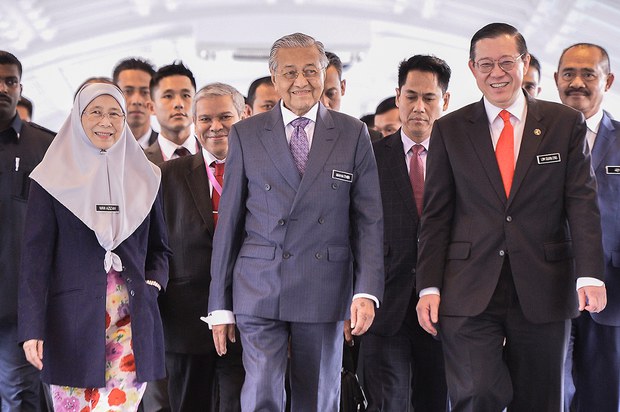Malaysia’s 2020 Budget Includes Program to Reduce Reliance on Foreign Workers
2019.10.11
Kuala Lumpur
 Malaysian Prime Minister Mahathir Mohamad (center), flanked by Deputy Prime Minister Wan Azizah Wan Ismail (left), and Finance Minister Lim Guan Eng head into Parliament in Kuala Lumpur to present the 2020 budget, Oct.11, 2019.
Malaysian Prime Minister Mahathir Mohamad (center), flanked by Deputy Prime Minister Wan Azizah Wan Ismail (left), and Finance Minister Lim Guan Eng head into Parliament in Kuala Lumpur to present the 2020 budget, Oct.11, 2019.
Updated at 10:37 p.m. ET on 2019-10-12
A program to develop human capital and reduce Malaysia’s reliance on low-skilled foreign workers as the country shifts toward a digital economy is part of a $71 billion spending plan for next year that the government unveiled Friday.
The second budget produced by the ruling Pakatan Harapan coalition since it was elected last year includes the Malaysians@Work initiative, which proposes to ease the dependency on foreign migrants by creating better job opportunities for Malaysian youths and women.
As he presented the proposed budget to parliament on Friday, Finance Minister Lim Guan Eng said incentives provided through the initiative were expected to help jobless Malaysians become self-reliant workers who could contribute to the labor market.
“The government anticipates that the Malaysians@Work initiative will cost 6.5 billion ringgit ($1.55 billion) over five years and create an additional 350,000 jobs for Malaysians and reduce dependency on foreign workers by more than 130,000,” he said.
Nearly 2 million foreign workers were registered under the Temporary Visiting Work Permit as of Aug. 31, including many from Bangladesh and Indonesia, according to media reports. A year earlier, the Singapore-based ISEAS – Yusof Ishak Institute reported that the number could be as high as 3.85 million by taking into account those working in Malaysia illegally.
In addition to improving the work environment, Guan Eng said the government was looking to spearhead a digital transformation of the economy through the development of the 5G mobile network, smart automation and training for “micro-digital entrepreneurs and technologists.”
The budget earmarks 10 million ringgit ($2.38 million) to leverage e-Marketplaces and social media platforms. Guan Eng discussed previous successes.
“One hundred of these micro-digital entrepreneurs, a majority of whom are women and youth, were able to generate 23 million ringgit ($5.5 million) in revenues over just six months, unleashing life-changing experiences,” he said.
In his speech to parliament, the finance minister said the government expected the 2020 spending plan to show a fiscal deficit of 3.2 percent as expenditures surpass revenues, compared with a 3.4 percent deficit in the 314.5 billion ringgit ($75.1 billion) budget for 2019.
When taking control of Malaysia’s government in May 2018, Prime Minister Mahathir Mohamad inherited a massive debt from the Barisan Nasional coalition. The ousted ruling bloc was led by former Prime Minister Najib Razak, who is facing trials tied to the alleged theft of billions of dollars from 1MDB, a state development fund.
“Despite the burden of servicing the nearly 1.1 trillion ringgit ($262.7 billion) of debt and liabilities inherited from the previous administration, this government remains committed to gradual fiscal consolidation,” Guan Eng said in his budget address.
Meanwhile, the government expects to save 18.8 billion ringgit ($4.49 billion) in its operating expenditures, setting spending at 241 billion ringgit ($57.57 billion) compared to 259.8 billion ringgit ($62 billion) this year.
The government is to increase the tax rate for those earning more than 2 million ringgit ($477,748), to 30 percent from 28 percent, while it has no plans to reintroduce the Goods and Services Tax (GST), according to Reuters news service. Shortly after taking office, Mahathir abolished the GST established under Najib’s government.
Parliament is expected to begin debate before approving the budget during its next session, which ends Nov. 28.
![191011-MY-Inside-2020Budget620.jpg Finance Minister Lim Guan Eng presents the 2020 budget to Parliament in Kuala Lumpur, Oct. 11, 2019. [S. Mahfuz/BenarNews]](/english/news/malaysian/new-budget-10112019154919.html/191011-MY-Inside-2020Budget620.jpg/@@images/6f0382f7-8f90-43da-b145-a14f474c19a7.jpeg)
Security spending
While the overall budget shows a 5.5 percent cut from 2019, the government will increase defense and public sector security spending by 3 billion ringgit ($716.7 million).
“The key focus going forward will be to enhance defense readiness, such as by improving the armed forces’ mobility,” Lim said. “Enhanced readiness includes meeting the changing nature of threats, such as having Fast Interceptor crafts for safeguarding the waters of Sabah.”
Aside from the overlapping territorial claims in the South China Sea among Malaysia, China and other Asian countries, Sabah is known as being susceptible to militant activities from the Mindanao region in the neighboring southern Philippines because of a porous maritime border between the two areas. Tourists and fishermen have been subject to kidnappings blamed on members of the Philippine-based militant group Abu Sayyaf.
Lai Yew Meng, a regional security analyst at the Universiti Malaysia Sabah, said the budget increase in the face of relatively subdued economic and fiscal conditions suggests the importance placed in strengthening national security.
“Whether or not the amount is adequate may not be as salient as the fact that this increase at a time of economic uncertainties, demonstrates the government’s earnest effort to ensure that our national security is not compromised,” Lai said.
Aminah Farid in Kuala Lumpur and Zam Yusa in Kota Kinabalu, Malaysia, contributed to this report.
This story was updated to correct the spelling of Lai Yew Meng's name.







